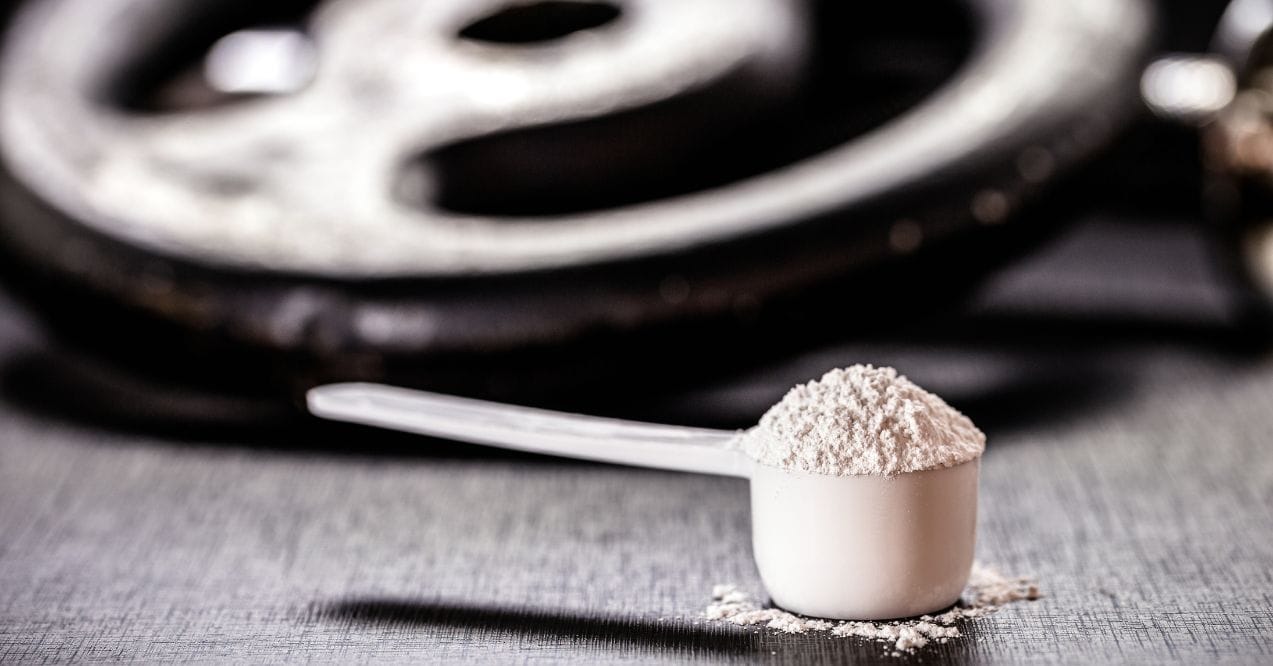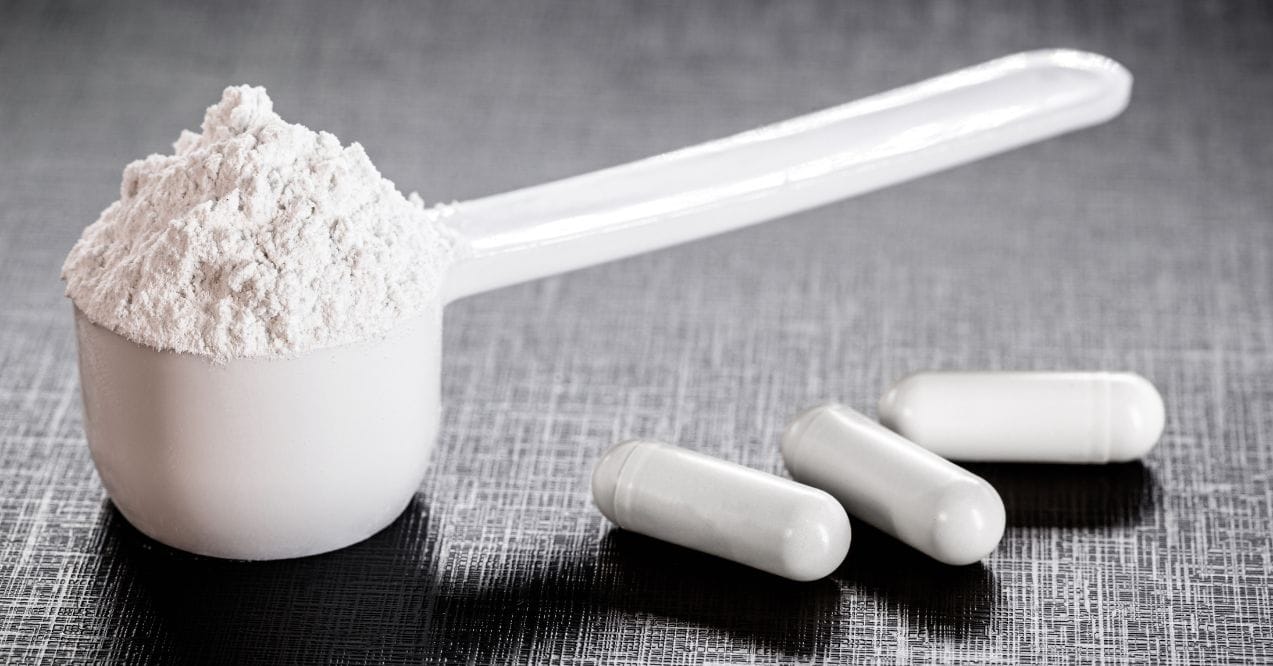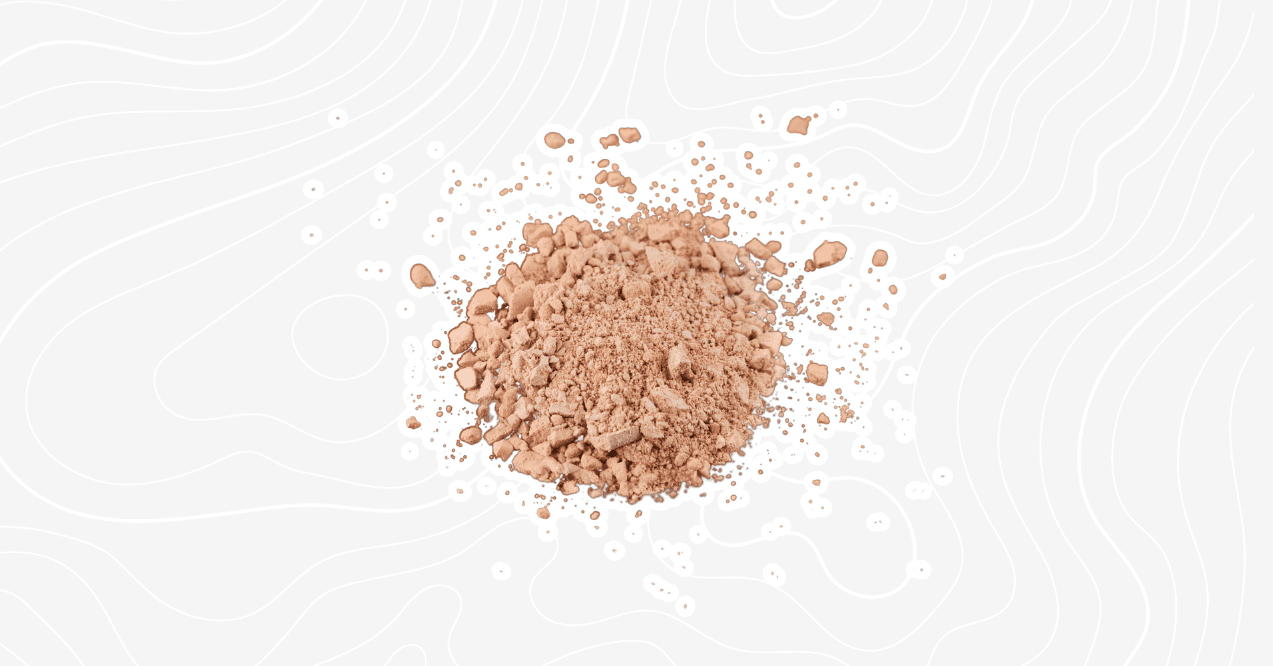What Does Mushroom Coffee Taste Like? (2024)
What are functional mushrooms? Have you heard about mushroom coffee? It’s a new trend that’s got people talking, and if you’re curious what does mushroom coffee tastes like, you’re not alone. Imagine mixing the benefits of mushrooms with your daily coffee – that’s exactly what mushroom coffee is all about. It’s for those who want to kick their energy up a notch in a natural way.
We’re diving into everything mushroom coffee in this article. You’ll learn about its background, why people are adding mushrooms to their coffee, and most importantly, what it actually tastes like. Plus, we’ll give you some tips on how to make mushroom coffee taste good, so you can enjoy it too.
People don’t just drink mushroom coffee for its taste; they love it for the health perks, too. We’re going to talk about the different kinds of mushroom extracts that are popular in these blends. They’re not just good for your body; each one has special health benefits. And for those wondering about caffeine, we’ll cover if mushroom coffee will give you that coffee buzz or not.
Ready to learn about mushroom coffee? Let’s get into it. By the end, you’ll know all about what mushroom coffee tastes like. Maybe you’ll even be ready to try a cup yourself. Let’s start this journey into the world of mushroom coffee together.
Key takeaways:
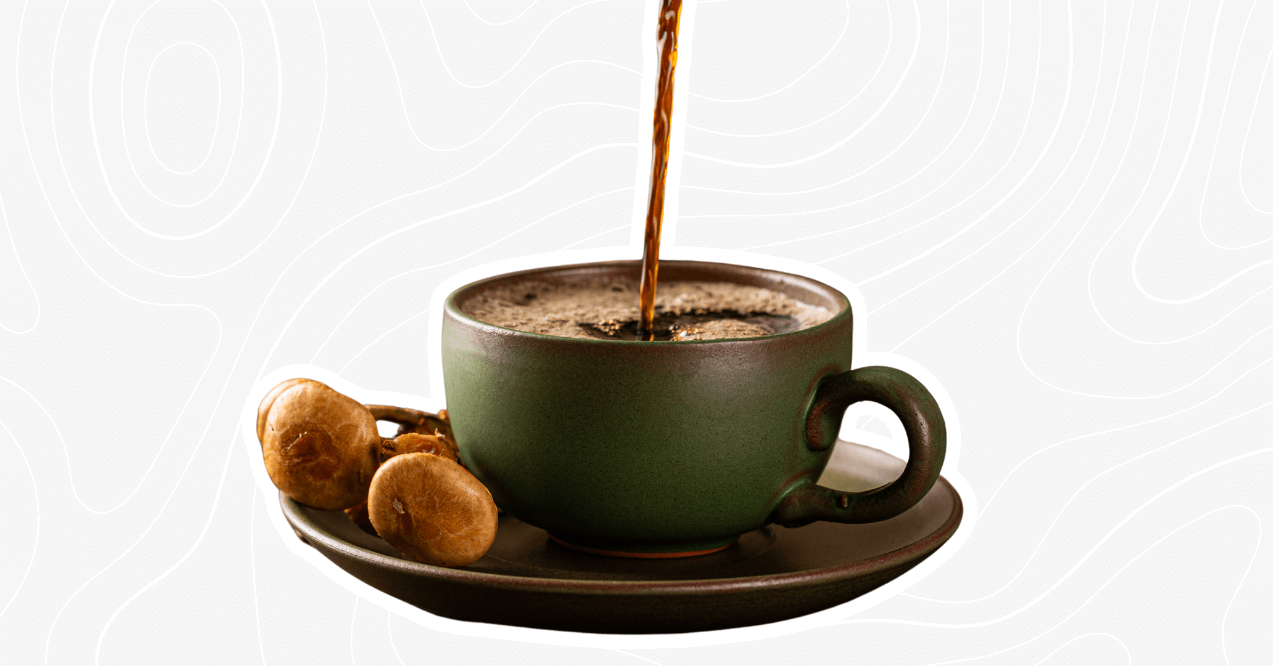
Where Does Mushroom Coffee Come From?
You might think mushroom coffee is a brand-new thing, but it’s actually got a history that goes way back. For hundreds of years, people around the world have been using mushrooms because they’re good for you. But mixing them into coffee? That’s a pretty new twist.
Mushrooms Meet Coffee
Let’s take a quick look at how mushroom coffee came to be. Way back, folks found out that certain mushrooms could make you feel better, boosting things like your immune system and your brain power.
These days, what’s in your mushroom coffee is likely a mix of regular coffee and mushroom powder from types like Chaga, Reishi, and Cordyceps, to name a few. These aren’t just any mushrooms—they’re the kind that bring a special kick to your cup and your health.
Brewing Mushroom Coffee
Making mushroom coffee is pretty easy. You just mix mushroom extract with your regular instant or ground coffee or you can use already prepared mushroom powder. This way, you still get your coffee taste and smell, but with an extra mushroom boost. And nope, we’re not talking about brewing actual mushrooms like you do coffee beans—it’s all about that extract mix-in.
Growing Popularity
Why are people so into mushroom coffee all of a sudden? Well, lots of us want something natural in our mugs, and when you hear about the mushroom coffee health perks, it’s a no-brainer to give it a try. Nowadays, you can find lots of flavors and blends, thanks to the companies jumping on the mushroom coffee train.
Sure, at first, the idea of mushrooms in your morning cup might sound strange—no one really wants to fish mushrooms out of their drink, right? But what you get is a taste that’s deep, a bit earthy, and totally unique. It’s a whole new way to enjoy your brew.

What Are Adaptogen Mushrooms?
Curious about these so-called adaptogen mushrooms popping up in your morning brew? Let’s chat about what these natural wonders are and why they’re not just your average mushrooms.
Ever heard of adaptogens? Think of them as your body’s stress-busting buddies. These aren’t just any mushrooms—they’re adaptogens, which means they’re great at helping your body handle stress and find its balance again.
They’re also called therapeutic or functional mushrooms because they go above and beyond in the health department. They lend a hand to your adrenal glands, those tiny managers inside you that regulate how your body deals with stress. The result? A boost to your overall well-being.
Now, when these mushrooms join forces with coffee, it’s not just about flavor (though they add a pretty interesting twist to your cup). They also bring their A-game to your health, offering a variety of benefits that can make you feel like a million bucks.
Is Mushroom Coffee Just a Hype?
Mushroom coffee is having a moment, but let’s be real – is it just a trendy thing, or is there something to it? Sure, it’s got a unique twist that might not be everyone’s cup of coffee, but there’s a lot of talk (and some science) that suggests it’s more than just a trend.
The interest is all about the benefits. Those adaptogen mushrooms – like Chaga and Reishi – are packed with goodies that can boost your immune system, tone down inflammation, and generally amp up your health game.
Now, about that taste. Mushroom coffee brings a new feeling to your mug. Imagine your usual coffee brightened up with some earthy, nutty notes. If you’re looking to shake up your morning routine, this could be your thing.
And hey, if you’ve ever felt jittery or had a stomach ache from your regular espresso shot, mushroom coffee might just be your new best friend. It may have a way of smoothing out the rough edges of caffeine, so you can wave goodbye to the dreaded coffee crash.
But here’s the thing: We’re still waiting on the science folks to give us the full scoop on mushroom coffee’s perks. People who’ve tried it say they feel more alert and on-the-ball, but it’s not a one-size-fits-all magic potion. It might be a game-changer for some, while others might be a bit more skeptical.
What Does Mushroom Coffee Taste Like?
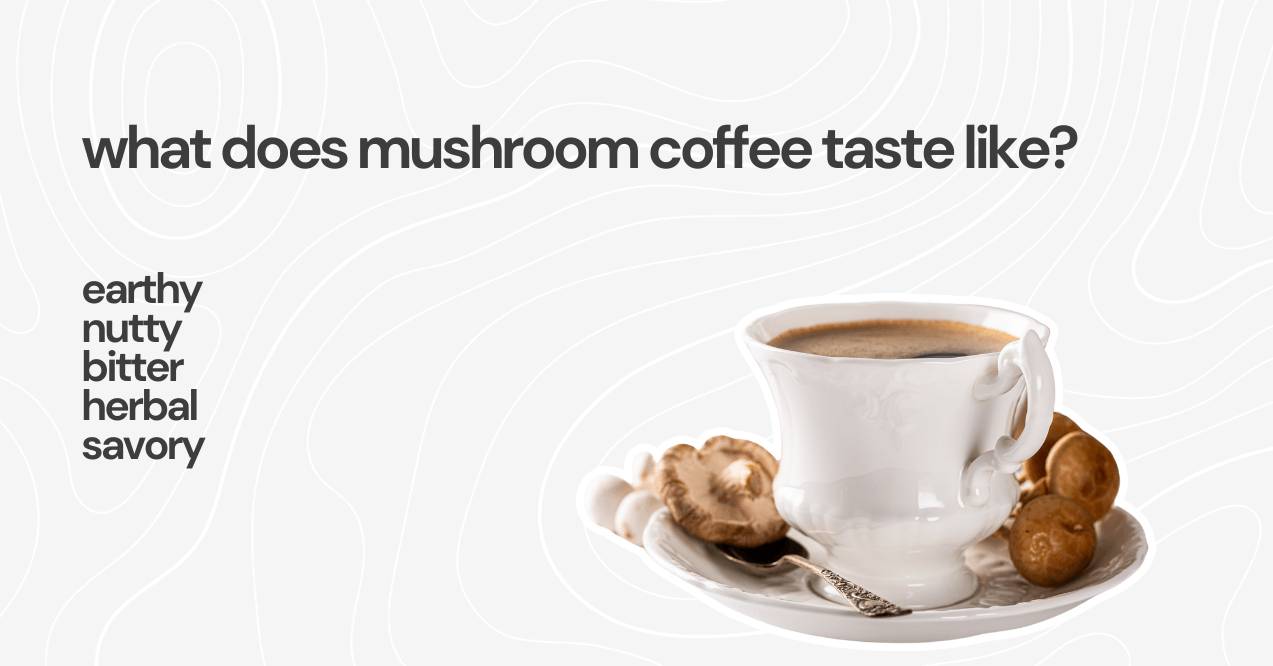
Got it, you’re curious about the flavor of this intriguing brew. What does mushroom coffee taste like? Well, it’s a bit of a tasty adventure, and the flavor can swing depending on the mix and mushroom types in your mug.
When you stir adaptogen mushrooms into the mix, you’re in for a new twist on taste. Think of it as your coffee’s earthy, mysterious cousin. The exact vibe of your sip will vary, but here’s the lowdown on the usual flavor notes in mushroom coffee:
- Earthy: Mushroom coffee tastes like the outdoors. Think of walking through the woods. That’s what Chaga, Reishi, and Maitake mushrooms add to your drink. It makes your coffee feel more natural and down-to-earth.
- Nutty: Some mushrooms, like Cordyceps, add a light nutty taste to your coffee. It’s a gentle flavor that makes your coffee richer without being too strong.
- Bitter: If you like the bitter taste in regular coffee, you’ll find it in mushroom coffee too, thanks to Reishi mushrooms. It’s a familiar taste, just with a new twist.
- Herbal: Turkey Tail mushrooms can make your coffee taste a little like herbs. This makes your drink feel fresh and a bit more special.
- Savory: Lastly, Maitake mushrooms give a savory taste to your coffee. It’s like a flavor boost that makes your usual cup more satisfying.
The flavor of mushroom coffee might change based on the precise blend and the proportion of coffee to mushroom extracts. Some mixes could have a stronger mushroom flavor than others, while others might match the coffee flavor better. Finding the perfect balance that suits you is all about experimenting with various brands and mixes.
Luckily for you, there are methods to make mushroom coffee more delightful if you’ve never tried it or are unsure about the flavor. Here are some tips on how to make mushroom coffee taste better:
- Sweeten It Up: If mushroom coffee tastes too strong, try adding a little honey, maple syrup, or coconut sugar. This can make it smoother and taste better. Find the sweetener you like best.
- Spice It Right: To make your mushroom coffee cozier, sprinkle in some cinnamon, cardamom, or nutmeg. These spices can soften the earthy taste and make your coffee more enjoyable.
- Creamy Twists: Like your coffee creamy? Put in some flavored milk or creamer. You can use regular milk or something like almond or coconut milk. Flavors like vanilla, caramel, or hazelnut can make your mushroom coffee taste really good.
- Mix It With Ordinary Coffee: Not sure about mushroom coffee? Mix it with the coffee you usually drink. Start with a little mushroom coffee, then add more as you get used to the taste.
- Experiment with Brewing: The way you make mushroom coffee can change how it tastes. Try different methods like a French press, a pour-over, or an espresso machine to find what you like best.
Everyone has a different taste, so what one person finds enjoyable may not be the same for another. Don’t be afraid to experiment with things and create your own special flavor and balance.
How Different Coffee Mushroom Extracts Are Beneficial for Your Body
Ever wondered what’s behind the buzz of mushroom coffee? Let’s break it down for you!
Chaga
First up, Chaga mushrooms. These guys are like the superheroes of antioxidants, fighting off free radicals that bring oxidative stress. Feeling under the weather? Chaga’s beta-glucans have your back, boosting your immune system. Plus, they might even help simmer down inflammation and generally make you feel awesome.
Reishi
Next, meet Reishi, the ancient “mushroom of immortality”. Sounds unbelievable, right? It’s been used for ages to keep you feeling zesty and might even help you live longer. It’s like a relaxation pill for your body, helping you handle stress and maybe even catch better sleep at night.
Cordyceps
Now, for the go-getters, Cordyceps is your new best bud. Need an extra push for your morning run? This mushroom is all about boosting endurance and getting more oxygen pumping. Athletes are big fans, and it could even keep your immune system in tip-top shape.
Turkey Tail
Turkey Tail mushrooms aren’t just fancy-looking; they’re immune system cheerleaders thanks to loads of beta-glucans. They also act like prebiotics, which means your gut’s gonna thank you. And there’s chatter about them being tough on cancer cells, but the jury’s still out on that.
Maitake
Finally, Maitake mushrooms are not just fun to say—they’re packed with perks. They’ve got your immune system’s back, help keep your blood sugar levels steady, and might be good for your heart.
Mix these mushroom extracts into your morning coffee, and you’ve got a power-packed cup. However, there is no doubt that we still need more science to back up all these benefits, but the potential is pretty exciting. Remember though, mushroom coffee’s got less extract than full-on supplements, so the effects might be more mellow. But it’s a tasty start to getting these fungi friends into your daily life!
Does Mushroom Coffee Contain Caffeine?
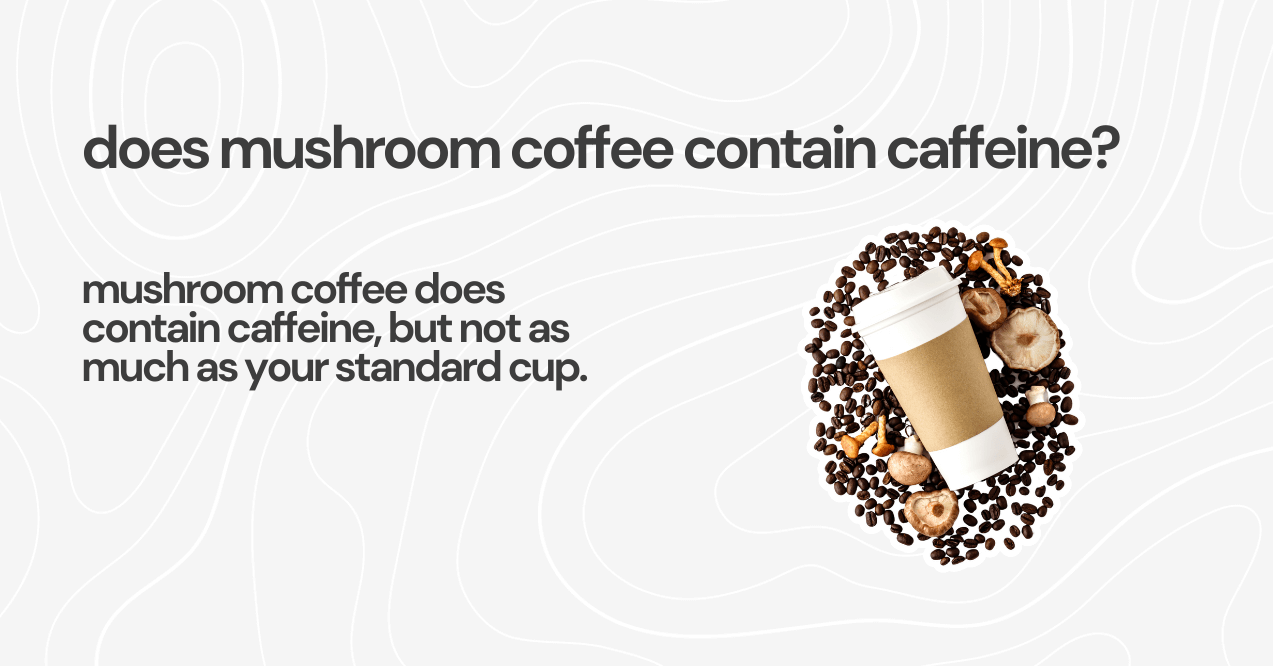
Wondering if mushroom coffee gives you the same caffeine boost as regular coffee? Let’s dive in.
Mushroom coffee does contain caffeine, but not as much as your standard cup. It typically has about half the caffeine content, making it a solid pick for those who want a less intense energy lift. If you’re sensitive to caffeine or just aiming to cut down, mushroom coffee could hit the spot.
It’s all about a smoother energy boost with mushroom coffee. Ingredients like Reishi and Cordyceps, known as adaptogenic mushrooms, are added to the mix. They’re famed for increasing stamina while helping your body manage stress, potentially reducing the jittery side effects of caffeine.
Thinking about trying it? It’s worth noting that caffeine levels can vary between different mushroom coffee brands. So, take a peek at the packaging to see what you’re getting into.
If caffeine isn’t your thing at all, there’s decaf mushroom coffee available too. You’ll get the mushroom benefits without any caffeine.
In short, mushroom coffee offers a milder caffeine experience while potentially supporting your health in other ways. It’s worth checking out if you’re after a gentler start to your day.
Wrap Up
As we wrap up this exploration into the intriguing world of mushroom-infused brews, let’s distill the essence of what mushroom coffee brings to your taste buds. Here are the key takeaways on the taste of mushroom coffee:
- Expect a blend of classic coffee bitterness with additional earthy and nutty undertones.
- Chaga, Reishi, Cordyceps, and other mushrooms each add their own flavor notes, from woody to savory or herbal.
- The ratio of coffee to mushroom extract in the mix will determine whether the mushroom or coffee flavor prevails.
- Personal preference is key, as some may enjoy the unique flavor as-is, while others might prefer to add sweeteners or spices to enhance the taste.
- Overall, mushroom coffee offers an earthy twist on traditional coffee, providing a new layer of flavor complexity to the morning ritual.
In essence, mushroom coffee tastes like a unique twist on your usual cup of joe, offering a new kind of earthy complexity to the coffee experience.
Enjoyed the article? You might want to know what are the amazing mushroom powder benefits as well!
Functional mushrooms, also called adaptogen mushrooms, help the body manage stress and support overall wellness. Varieties like Chaga, Reishi, and Cordyceps are commonly used for their health benefits, such as boosting the immune system, reducing inflammation, and enhancing energy.
Mushroom coffee has earthy, nutty, and sometimes herbal undertones, depending on the mushroom blend. It still retains the bitterness of regular coffee, offering a unique and more natural flavor experience.
Yes, mushroom coffee typically contains caffeine, but usually half the amount found in regular coffee. This makes it a good option for a milder energy boost without the typical jitters or crash associated with high caffeine levels.
Advertisement. This site offers health, wellness, fitness and nutritional information and is designed for educational purposes only. You should not rely on this information as a substitute for, nor does it replace, professional medical advice, diagnosis, or treatment. If you have any concerns or questions about your health, you should always consult with a physician or other health-care professional. Do not disregard, avoid or delay obtaining medical or health related advice from your health-care professional because of something you may have read on this site. The use of any information provided on this site is solely at your own risk.
